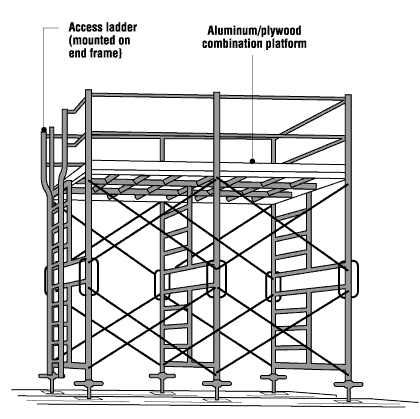Platforms - Scaffold Use
On this page
What should you check before using a scaffold?
Back to topInstall, inspect, maintain and repair scaffolding according to standards, regulations, and manufacturer's instructions.
Check the following before using scaffolding and inspect on an adequate basis:
- the base is sound, level and adjusted,
- legs are plumb, and all braces are in place,
- locking devices and ties are secured,
- cross members are level,
- planks are of the proper grade(s) of lumber and have no weak areas, deterioration, or cracks.
- planks, decks, and guardrails are installed and secure, and
- keep a log of inspections and related items or repairs.

What should you do when using a scaffold?
Back to top- Make sure all platforms above 2.4 metres (8 feet) are fully decked or at the height required by your jurisdiction.
- Use an access ladder, not the scaffold frame, unless it is specially designed to be climbed. Build a staircase if the scaffold will be used for a length of time.
- Build a rest platform for every 10 m (30 ft) in height beside the ladder.
- Remove snow and ice from scaffold platforms, ladders, and access areas.
- Ensure that the scaffold is securely attached to the building structure. Check the requirements of the legislation applicable to your jurisdiction.
- Provide adequate ventilation for the work done inside the scaffold if the scaffold is completely hoarded. Note also that the effects of winds increase when scaffolds are covered (hoarded).
- Make sure scaffold planks are in good condition and are cleated properly.
- Make sure the planks have an appropriate amount of overhang – too much and the planks may tip, and too little and the planks may slip off.
- Use all of the components required, including base plates, connections, braces, and securing devices (e.g., “banana” clips, “pigtails,” tie-ins, etc.)
- Protect all planked or working levels with proper guardrails, mid rails, and toe boards along all open sides and at the ends of scaffold platforms.
- Replace any guardrails that were removed while hoisting materials. Wear fall protection until guardrails are reinstalled.
What should you not do when using a scaffold?
Back to top- Do not use a scaffold without guardrails.
- Do not load in excess of its rated working load.
- Do not jump on planks or platforms.
- Do not force braces to fit. Level the scaffold until a proper fit can be made easily.
- Do not climb or stand on cross braces or guardrails.
- Do not work on scaffolds during storms or high winds.
- Do not use ladders or makeshift devices on top of scaffolds to increase height.
- Do not overload scaffold frames or platforms.
- Do not load in a way that affects its stability.
- Do not rest materials or equipment on guardrails.
- Do not try to repair bent or kinked frames. Throw them out.
- Do not work below a scaffold without head protection.
- Do not roll a scaffold while workers are on the platform.
- Do not use scaffolds near electrical wires.
- Fact sheet confirmed current: 2024-10-08
- Fact sheet last revised: 2017-11-01

